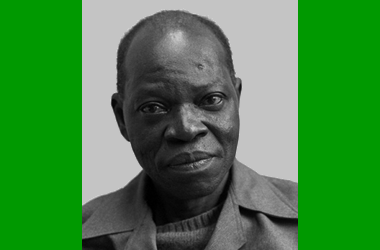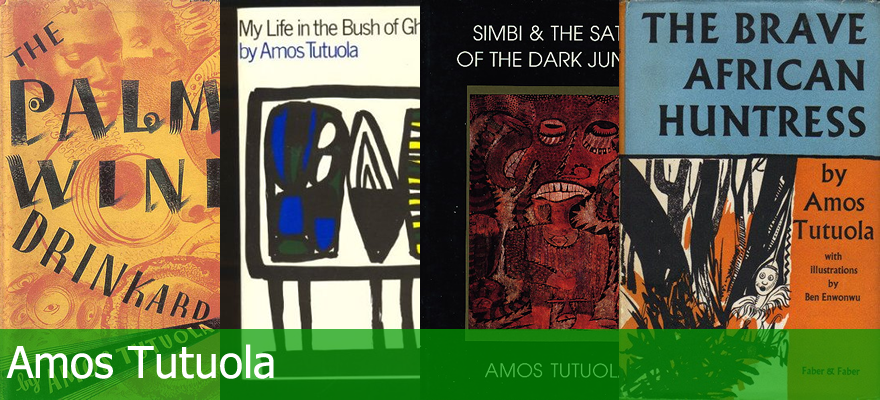Amos Tutuola was a largely self-taught Nigerian writer who became internationally famous for his books based in part on Yoruba folktales, especially The Palm-Wine Drinkard. He was the third African ever to be granted an honorary fellowship by the Modern Language Association of America.
Early Life
Tutuola was born in Ipo-Ase, Abeokuta, Ogun State on June 20, 1920. His parents, Charles and Esther, were cocoa farmers. His mother and aunt introduced him to Yoruba folk stories when he was a young child. When he was about seven years old, one of his father's cousins took him to Lagos to live as a servant with FO Monu, an Igbo man who paid for the young Tutuola to attend a Salvation Army primary school in lieu of wages. He attended Lagos High School for a year and worked as a live-in houseboy for a government clerk in order to finance his tuition.
Tutuola's formal education was limited to six years as when his father died in December 1938, he had to end his studies. He tried his hand at farming but his crop failed and he moved to Lagos in 1940. He trained as a blacksmith, the trade which he practised from 1942 to 1945 for the British Royal Air Force in Nigeria. He also tried a number of other vocations, including selling bread and working as a messenger for the Department of Labour. In 1947 he married Victoria Alake, with whom he had four sons and four daughters.
Writing
While a messenger for the Department of Labour, Tutuola had plenty of free time which he spent writing stories. He wrote his novels in English rather than in Yoruba, his mother tongue. In 1948, Tutuola sent his first long narrative, The Wild Hunter in the Bush of the Ghosts, which was influenced by Daniel O. Fagunwa's Ogboju ode ninuigboirunmale, toFocal Press, an English publisher of photography books. Tutuola had hired a local boy to draw pictures of the ghosts described in the story, took photographs of the boy's sketches and included them in the book as illustrations. Although the story and accompanying images were not suitable for Focal, the publisher bought them for a small sum to support Tutuola's creative efforts and then shelved the manuscript (the book was eventually published in 1982 by Three Continents Press).
His most famous novel, The Palm-Wine Drinkard and his Dead Palm-Wine Tapster in the Deads’ Town, was written in 1946 and published in 1952 in London by Faber and Faber. Gaining international accolades, it was published in New York byGrove Press and translated and published in Paris as L'Ivrogne dans la brousse by French writer Raymond Queneau in 1953. The novel is a transcription in Pidgin English of a mythological tale of Tutuola's own invention: a drunken man follows his dead palm-wine tapper into "Deads' Town", a world of magic, ghosts, demons and supernatural beings. Many of the motifs in the work draw on Yoruba oral tradition, such as magical transformations and animals behaving like humans.
Noted poet Dylan Thomas brought the book much attention, describing it as "brief, thronged, grisly and bewitching." Although the book was praised abroad, it faced severe criticism from Nigerians because of its use of "broken English" and its "primitive" style which many argued promoted Western stereotypes of "African backwardness". After the storm surrounding its publication had calmed, a stage version of the novel adapted by Tutuola was performed at the Arts Theatre of the University of Ibadan in April 1963, with Yoruba composer and thespian Kola Ogunmola acting the role of the protagonist.
The Palm-Wine Drinkard was followed by My Life in the Bush of Ghosts in 1954, as well as several other books in which Tutuola continued to explore Yoruba traditions and folklore. However, none of his subsequent works managed to match the success of The Palm-Wine Drinkard. Many of Tutuola's papers, letters and holographic manuscripts are stored in the archives of the Harry Ransom Center of the University of Texas, Austin.
Tutuola joined the Nigerian Broadcasting Corporation in 1956 as a storekeeper and in 1957 he was transferred to Ibadan, Oyo State where he spent most of his productive years. In retirement, he divided his time between residences at Ibadan and Ago-Odo, Ogun State.
Other works by Tutuola include Simbi and the Satyr of the Dark Jungle (1955), The Brave African Huntress (1958), Feather Woman of the Jungle (1962), Ajaiyi and his Inherited Poverty (1968), The Witch Herbalist of the Remote Town (1981), The Wild Hunter in the Bush of the Ghosts (1982), Yoruba Folktales (1986), Pauper, Brawler and Slanderer (1987) and The Village Witch Doctor and Other Stories (1990).
Tributes
The popular television show Law & Order: Special Victims Unit has a character (Odafin Tutuola, played by rapper Ice-T) whose name is drawn from Tutuola's family. British musicians Brian Eno and David Byrne of the band Talking Heads named their 1981 album after his novel My Life in the Bush of Ghosts.
Death
Tutuola died at the age of 77 on June 8, 1997 from hypertension and diabetes.
Sources
- Pegasos Authors' Calendar
- Wikipedia
- University of Texas website
- Encyclopedia.com
- Christopher Okigbo Foundation website
Picture sources: Flogging Babel, Goodreads, On World Literature, and Amazon


